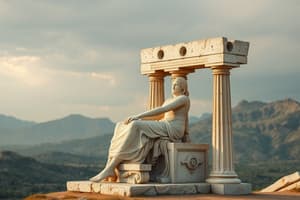Podcast
Questions and Answers
Which of the following questions represent fundamental philosophical inquiries?
Which of the following questions represent fundamental philosophical inquiries?
- What is the best restaurant?
- How can I make a lot of money?
- What is the world really made up of? (correct)
- Why is the world the way it is? (correct)
What does the term 'philosophy' mean?
What does the term 'philosophy' mean?
Love for wisdom
Who is known as the first philosopher to have systematic thinking about the self?
Who is known as the first philosopher to have systematic thinking about the self?
Socrates
Socrates believed that material things like wealth can provide true happiness.
Socrates believed that material things like wealth can provide true happiness.
What did Plato found?
What did Plato found?
What is the philosophical concept proposed by René Descartes?
What is the philosophical concept proposed by René Descartes?
What are the components of the soul according to Plato?
What are the components of the soul according to Plato?
John Locke believed that people are born with innate knowledge.
John Locke believed that people are born with innate knowledge.
Who is considered the father of modern philosophy?
Who is considered the father of modern philosophy?
What characterizes David Hume's view of the self?
What characterizes David Hume's view of the self?
Flashcards are hidden until you start studying
Study Notes
Philosophy Overview
- Originates from the Greek words 'philos' (love) and 'sophia' (wisdom).
- Examines man's nature and existence, posing critical questions about reality and change.
Pre-Socratic Philosophers
- Thales of Miletus: Proposed that water is the essence of all matter; believed the earth is flat.
- Pythagoras of Samos: Focused on the soul's fate after death, promoting reincarnation views.
- Parmenides of Elea: Known as a philosopher of changeless being, exploring the nature of reality.
Socrates
- Pioneer of systematic introspection, emphasizing self-knowledge.
- Argued that true happiness cannot be achieved through material wealth or power.
- Sought universal truths and believed in immutable ideals like beauty, justice, and bravery.
- Advocated for understanding the duality of human existence (body & soul).
- Warned that societies neglecting philosophical inquiry would face misery.
- Executed for impiety and corrupting Athenian youth.
Plato
- A student of Socrates; founded the Academy to pass on his philosophical teachings.
- Divided reality into two realms:
- Ideal: Perfect reality of existence.
- Phenomena: Flawed physical world reflecting the Ideal.
- Introduced the concept of Forms, arguing every object in the world is a reflection of higher realities.
- Identified three components of the soul:
- Appetitive: Represents basic human desires and pleasure.
- Rational: Governs affairs through reason; conscious mind.
- Spirited: Moral aspect that seeks honor and victory, driven by emotions.
St. Augustine
- Centered his philosophy on God, highlighting man’s relationship with the divine.
- Built on Plato's dual nature theory, integrating it into Christian philosophy.
- Proposed that humans should strive for spiritual bliss with God, aligning their lives with this goal.
René Descartes
- Labeled the father of modern philosophy, advocating for observation and experimental science.
- Introduced methodical doubt; fundamental assertion: "Cogito, ergo sum" (I think, therefore I am).
- Proposed that self-existence cannot be doubted, laying new epistemic foundations.
- Developed the concept of Dualism, distinguishing between mental (cogito) and physical (extenza) entities.
John Locke
- Founded British empiricism, asserting humans are free and created equal by God.
- Stressed that knowledge arises from experience and sensation.
- Coined the term Tabula rasa, suggesting humans are born as blank slates, with identity formed by experiences and environment.
David Hume
- Empiricist philosopher who questioned the existence of a self that transcends the physical body.
- Defined the self in relation to our perceptions and experiences, challenging traditional notions of identity.
Studying That Suits You
Use AI to generate personalized quizzes and flashcards to suit your learning preferences.




